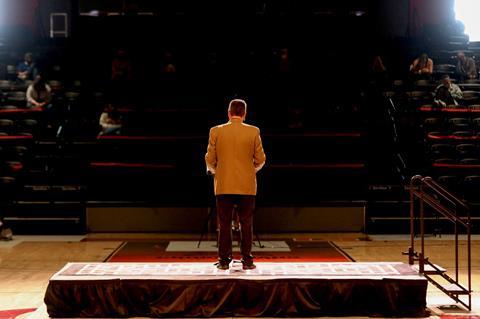It’s not just the world that has a professional speaker circuit, the Church does too. But in only hearing from the same high-profile leaders at our major Christian events and conferences, we may be missing what God is doing, says Lee Jackson

Back in the 90s, I was on the Christian band circuit for a while. I even co-wrote that semi-famous Christian dance classic ‘Jumping in the house of God’. Yeah, I know - sorry! We played most weekends at small and large events all over the UK and, occasionally, overseas too. We supported the World Wide Message Tribe on tour and even headlined festivals with them. It was amazing. I look back on those times with great fondness and only the occasional whiff of disappointment as I think, for the thousandth time: “who did those royalties actually go to?” Most musicians think the same.
But, as I look back to those days, I realise that we saw the same bands again and again: the likes of the excellent Eden Burning and Split Level, along with many short-lived hip hop and dance music collectives. It was definitely a ‘circuit’; we spent whole summers bumping into one another at events like Spring Harvest, Soul Survivor and Greenbelt.
The best speakers may not be pastors or charity CEOs, and they may not be white and male
Now, I’m a professional speaker and not a musician. And as I reflect on my last 14 years in this job, I can see that there are definitely 'speaker circuits' too: after dinner engagements, football award dinners, the golf club circuit, the Women’s Institute, motivational speaking, professional bodies, business networking events and many more - how do I know? Because I speak at many of these types of events myself.
But there is definitely a Christian speaker circuit too, whether we acknowledge it or not, with many of the same names popping up again and again. Most are great, of course, and straddle the line of being challenging, but not too challenging - ideal for the mainly conservative and risk-averse demographic of most Christian events.
Now, before you think I am writing this out of jealousy or sour grapes, I’m not. The Christian speaking circuit isn’t my world or my target market. It’s not my mountain to climb. But there are a few things that worry me about hearing the same few voices at churches, Christian events and even now on podcasts. If the Church, the Christian media and Christian events constantly give platform to the same names, it’s bad for the Church as a whole because:
1. It inhibits growth
Some denominations and church streams even go as far as having their own approved lists of speakers, with all of their visiting preachers being centrally controlled. It may make admin easier and reduce the risk of a preacher going off-piste, but I think it can be bad for the Church.
If we are truly kingdom-minded, we need cross-denominational preaching and teaching. My dad was a Church of England vicar. Most years, he’d do a pulpit swap with the local Methodist or Baptist minister. It produces a healthy exchange of outlooks and ideas, promotes unity and encourages growth. Hearing the same people, the same stories and the same theology again and again means we’re never challenged by new ideas or different perspectives. It can make us static and stilted. We don’t grow. Getting nudged out of our comfort zone is where growth really happens.
2. It becomes an echo chamber
Has the Church lost the ability to allow dissenting voices? I occasionally listen to people I don’t agree with on podcasts. We all should. No, really, we should.
I spent lockdown as part of a weekly online comedy club with people from all walks of life. I was probably the only Christian there, trying to bring some salt and light in that tough season. Maybe some dissenting voices should be trusted to speak at Christian events?
Justin Brierley’s excellent podcast, Unbelievable?, is a great example of this; he models it fantastically. We can bring opposing views together well. And it can be a good thing.
3. It creates a platform culture
People often look up to the ‘platform’, like it is the only place to aim for. It should never even be aspirational; our aspirations should be to work and serve - and if we get a platform on that journey then so be it. But the platform itself is not a magical place and it should not be deified, and nor should the people on that platform.
In recent days, there has been some controversy about VIP tickets for a ‘meet and greet’ with celebrity worship leaders (see here and here). In elevating worship leaders - and speakers too - we are in danger of creating a celebrity culture within the Church where people become worshipped, rather than God.
4. It’s just advertising
Many speakers regularly booked for large conferences and events are often representing the organisations they lead. They speak to promote. I notice this, because it’s a successful business model that I, too, have often adopted to promote my own books or services in the secular world. But having a speaker at a church or Christian event who is primarily there to promote something means they may be more focused on the selling than communicating God’s word. Let’s not be naïve. Most events have sponsors, and they buy their platform time, just like at a business awards event. Yes, God can use them - and he does - but it can also be a paid-for sales pitch that can be at odds with the message that needs to be preached.
5. It kills diversity
We need people from all backgrounds to be speakers, not just the heads of organisations. What if the leaders of these Christian organisations are all male and white for instance (which they often are)? I have seen whole stages full of white males in the past. We need to do better. We have undoubtedly taken steps forward but, as we have heard from recent church controversies over race and misogyny, we still have a long way to go.
Mixing it up
Before you get angry or comment online about this, let me explain a little more: I am still, in my 50s, genuinely trying to follow Jesus. I’m not disgruntled. I’m not angry. I’m not living in unforgiveness. By raising these things, my goal is not to criticise anyone - especially Christian speakers. Many of their words have changed my life and God uses them enormously. I know quite a few of them; they are my mates. I have even consulted with some of them before writing this article. But, what I am saying is that we, as the Church, should really think about the speaker circuit that we’ve created and – whether consciously or unconsciously - maintain.
Hearing the same voices again and again can limit our view of what God is doing in the world
As we come out of this pandemic, there’s never been a better time to shake up the preaching rotas in our churches. And it’s certainly time to shake up our Christian conferences! The best speakers out there may not be pastors or charity CEOs, and they may not be white and male. We need more women preachers, more diversity of race, background - and theology too, to an extent.
When was the last time you heard a working class speaker at a Christian event? When did you last hear a teaching assistant, cleaner or dental nurse share a word, their testimony or be interviewed on stage? (Widening opportunities in this area is an ideal way to broaden the voices heard: being a keynote speaker is a lot of hard work and not everyone is gifted or called do that. But many people are very happy to be interviewed on stage and it can be a great way to build skills and experience.)
So let’s recognise that we do have a Christian speaker circuit. And let’s try to mix it up where we can. Asking the question: “who is the best person for the job?” is a great place to start. Perhaps it’s a Christian who is working in business or a Christian leader from the public sector. Let’s look for the Christians out there doing an amazing work in the community, feeding the poor, bringing a prophetic voice in our nation. They may be working in the arts, in entertainment, business, education or public services. They may not even be – whisper it! - in the Christian Twitter bubble! Perhaps then we won’t only hear from pastors and CEOs of Christian charities at events.
Let’s be careful we don’t just hear the same voices - again and again - and limit our view of what God is doing out there in the world. Different kinds of people with different stories bring a fresh perspective. They help us think differently, discuss and deepen our faith. Let’s have the guts, the right theology and the kingdom mindset to widen the depth and breadth of speakers we invite to our church or conference.
You know it makes sense.
































